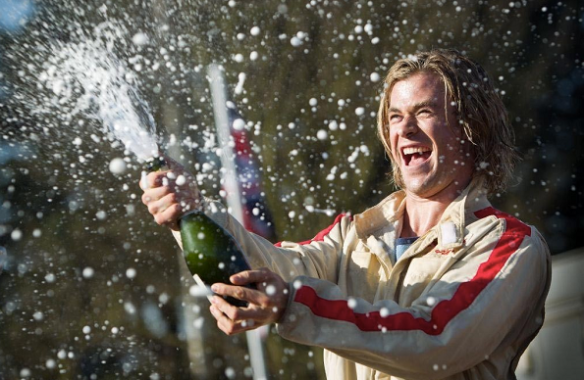Rush
Directed by: Ron Howard
Written by: Peter Morgan
Starring: Chris Hemsworth, Daniel Brühl, Olivia Wilde and Alexandra Maria Lara
Ron Howard is not a director often associated with the word exhilarating. His diverse directorial efforts are often quite safe and stale; safe enough for Academy voters (A Beautiful Mind, Apollo 13) or stale enough for box office draw (Da Vinci Code, How the Grinch Stole Christmas). The two sides of Ron Howard, unlike, say, the two sides of Steven Soderbergh or Gus Van Sant, are not interesting enough to really write about.
That being said, Rush is probably the finest film he’s ever made, and by far the most interesting. He showed an impressive knack for organic suspense and working with actors in 2008’s Frost/Nixon, so much so that Frank Langella’s turn as Richard Nixon is the only thing that people really remember about it.
Rush is very much a cinematic experience, though making a movie about Formula One racing is inherently cinematic. Like Frost/Nixon, it tells the story of a showdown between two mismatched rivals in the ’70s. There is the impossibly gorgeous playboy James Hunt (Chris Hemsworth) and the serious, unlikable and technically brilliant Niki Lauda (Daniel Brühl). In the loud, thrilling depths of their rivalry, Howard and cinematographer Anthony Dodd Mantle also find moments of humanity and emotional insight.
Peter Morgan’s screenplay walks a rare tightrope for a rivalry movie, sympathizing with neither driver more than the other. Lauda narrates brief segments, but this is more of a narrative device to express internalized character than it is positioning viewers on his side. He is often insufferable, as is Hunt. Though they both suffer from incurable, intense narcissism, they also register as humans rather than gods. When Hunt desperately fucks an airport stewardess after his wife (Olivia Wilde) leaves him, the camera is positioned on his empty eyes.
What we really see, though, is hair. His hair and the stewardess’ are the same length and color, and it looks like he is having sex with himself, which he is in a way. I can’t recall a single moment like this in any other Ron Howard movie, an effort to rise above what’s in the script. The best moments in Howard’s movies are usually in the service of words, but Rush moves with a ferocity that most Hollywood movies don’t even attempt. It has visual spontaneity that makes it consistently surprising even though the rivalry story it’s telling is fairly basic.
Hemsworth and Brühl give two equally fantastic but polar opposite turns. Hunt is a man hiding inner emptiness with outward spectacle, and Hemsworth finally gets a chance to drop the Thor getup (and a lot of other clothes) and dig into a role. Brühl, on the other hand, makes no effort to hide Lauda’s intensity, and Howard makes no effort to hide the distaste nearly everyone else in Formula One had for him. The only person that can really tolerate him is his wife Marlene (Alexandria Maria Lara). This romantic relationship underscores Hunt’s failures at stability. Glory pushes him because its seemingly one of the only things he has.
It is Hunt’s intensity and showmanship and Lauda’s technical prowess that, the script claims, pushed each man to do better. The final race is surprisingly anticlimatic for one of them, but Howard still finds suspense by sticking to the true story. It is less about the men and their cars and more about that lifestyle and its all-encompassing impact on their very different lives.
Grade: B



Pingback: Our Favorite Movies of 2013 | CyniCritics